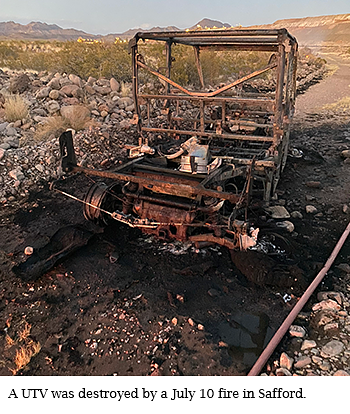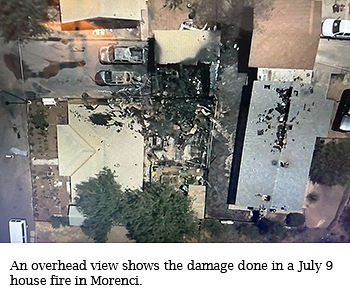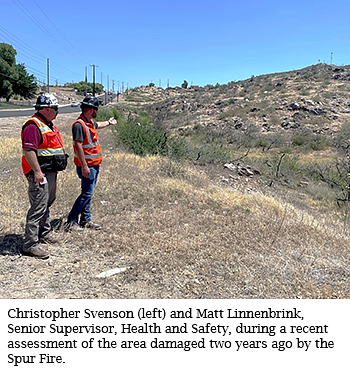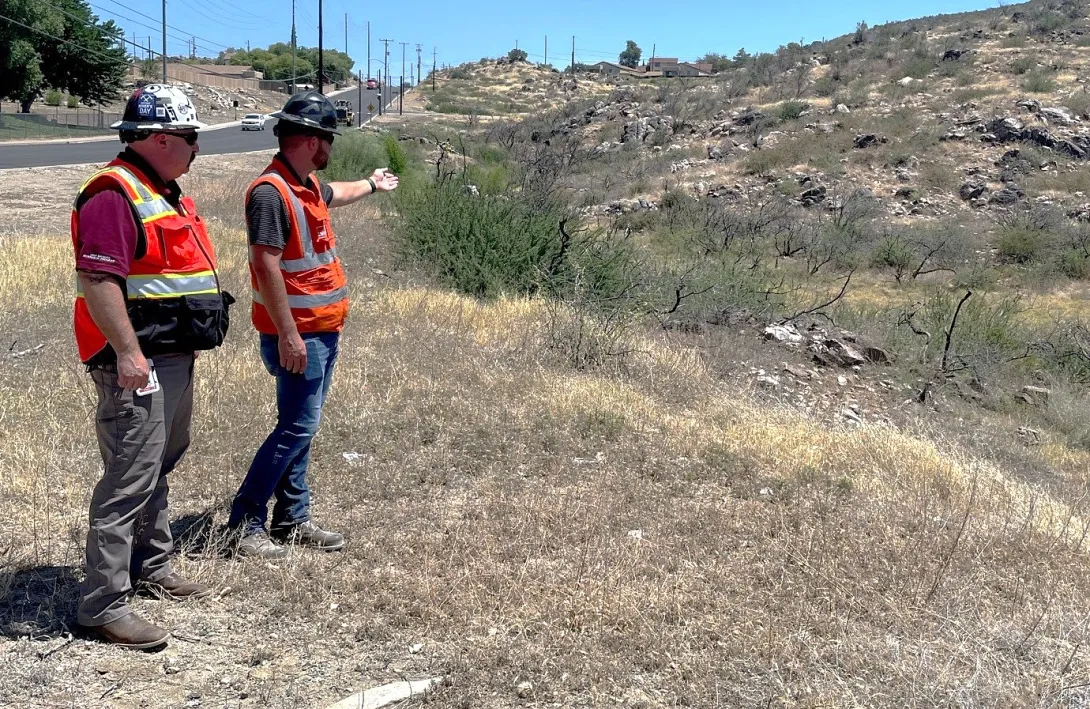 When Christopher Svenson recently got word that a construction crew hired by the company had ignited a brush fire in Bagdad, his mind instantly went to the Spur Fire that consumed a swath of the town two years ago.
When Christopher Svenson recently got word that a construction crew hired by the company had ignited a brush fire in Bagdad, his mind instantly went to the Spur Fire that consumed a swath of the town two years ago.
The circumstances of how the July 6 blaze started were almost identical to those that led to the Spur Fire in May 2021. A crew contracted by the company to perform grading work near the town struck a rock with a piece of equipment, causing a spark that ignited the nearby vegetation.
The Spur Fire quickly burned about 150 acres and destroyed 12 homes in Bagdad. Fortunately, the fire earlier this month was contained quickly and burned only a few acres without threatening any buildings or people.
“My mind instantly went to the Spur Fire,” said Svenson, Health and Safety Manager at Bagdad. “I was so anxious about it happening all over again. The whole management team was the same way.”
Svenson saw first-hand how quickly a small spark can turn into a devastating wildfire in the Arizona desert. With temperatures exceeding 100 degrees and heavy accumulations of dried-out brush, the difference between a minor incident and a runaway wildfire can be nothing more than a gust of wind.
 Fires at multiple locations
Fires at multiple locations
In recent weeks, there have been several close calls involving fire at the company’s Arizona sites.
Aside from the Bagdad blaze, a utility task vehicle (UTV) being driven across the new Lone Star Phase 2 leach pad in Safford caught fire and was destroyed. In Morenci, a company-owned house was destroyed, and two others were damaged by a fire that involved a resident of one of the homes, and not any company work crew or contractor. The cause has not been determined for either of those fires.
No one was injured in any of the recent fires, and aside from the houses in Morenci, the blazes were contained and put out before doing major property damage.
But the danger is there, which is why it so important that fire safety awareness be stressed and that fire prevention protocols be followed by employees and contractors, said Vicki Seppala, General Manager-Safford.
“It’s a tinderbox that we’re working in,” Seppala said. “In Arizona and other places at this time of year, one spark is all it takes to create a massive problem in a very short period of time. We have to be aware of how quickly it could get out of control. It can get out of hand in the blink of an eye.”
The company has “hot work” protocols for working around fire hazards, and it’s important that people follow them, Seppala said. Assessing the danger of sparking a fire is a basic component of any job. So is ensuring there are proper safeguards in place to prevent a fire before the work begins.
 “All of the tools are there,” Seppala said. “In this overheated, water-starved part of the country, you’ve got to be mindful of sparks and the devastation that happens. Not only to people and infrastructure and wildlife and everything else, but also that it could impact someone’s livelihood and their life.”
“All of the tools are there,” Seppala said. “In this overheated, water-starved part of the country, you’ve got to be mindful of sparks and the devastation that happens. Not only to people and infrastructure and wildlife and everything else, but also that it could impact someone’s livelihood and their life.”
The recent fire in Bagdad was particularly frustrating because the hot work protocols were in place but not followed by the contractor, Svenson said. The rules required that a water truck be at the job site at all times to extinguish any fires, and that the crew has a full-time spotter to watch for any flames or other hazards.
But the workers continued grading while the water truck left the area to refill and there was no person whose sole responsibility was to watch for hazards.
Planning ahead
In the two years since the Spur fire, Bagdad teams have been proactive in clearing fuels, building fire breaks and educating people in the community about the dangers of wildfire, Svenson said. Wildfire safety is frequently discussed in meetings involving everyone from top site leaders to front-line workers.
But none of that counts for much if safety rules are not followed, Svenson said.
“It’s frustrating that we are putting a lot of money, effort and time into keeping the town safe, and someone could become complacent and do something like this,” Svenson said.
Complacency always is a concern when it comes to safety but particularly dangerous this time of year when wildfire danger is at its peak, said Bobby Pollock, General Manager, Administration-Morenci. Stringent requirements to prevent brush fires might not seem as important in the winter or during the rainy season. So, there is a risk that people will get “tunnel vision” and not appreciate the risks when the weather turns hot and dry, said Pollock, a volunteer on the Clifton Fire Department.
There is no excuse for cutting corners any time, he said. Every job has time built into it to take all necessary safety precautions. Any worker who sees an unsafe situation is authorized to stop the work until the issue is addressed.
“We should always follow the rules,” Pollock said. “The rules are put in place for reasons, and those reasons are to protect our employees, our environment, our equipment and our surrounding communities.”
